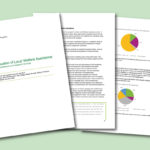Councils provide a vital safety net to households in financial crisis and should receive long-term government funding for local welfare services, according to the first in-depth evaluation of its kind.
The cross-party group London Councils commissioned independent research looking at the role played by boroughs’ Local Welfare Assistance (LWA) schemes in helping residents, including in preventing homelessness.
London Councils says this provision is needed “more than ever” due to the severe cost-of-living pressures facing low-income residents, but warns that tight funding constraints undermine local authorities’ ability to offer support.
Led by analysts at the research firm Policy in Practice and co-funded by the Greater London Authority, the evaluation of LWA schemes in the capital found:
- A vast range of events can cause financial crisis and trigger an application for welfare assistance. Examples included domestic abuse, flooding of homes, redundancy, and bereavement. Many applicants had experienced severe delays in receiving benefits payments, suggesting delivery problems in the national benefits system are a factor driving demand for local welfare support.
- Typically, all other support routes have been exhausted before residents request help from their council. Applicants reported that their only other options would be extremely risky and potentially harmful, including living without electricity, taking out unsuitable loans, and stopping eating.
- Council rent arrears of LWA recipients decreased significantly compared to an average increase for all low-income households, strongly suggesting that LWA provision has a positive impact on housing security and homelessness prevention.
- As well as benefiting from the monetary support, LWA recipients reported improved mental health from knowing that a safety net exists and that council staff were working to help them.
- LWA provision enables councils to respond to hardship in their communities flexibly and strategically, including through signposting recipients to other local services and supporting them through better budgeting and debt management approaches.
Concluding that councils are best placed to provide this emergency support to residents, the researchers recommend that central government re-establishes ring-fenced, long-term funding for local authorities’ LWA schemes. The Government abolished direct funding for LWA from 2015/16, leaving local authorities to decide whether to maintain an LWA service paid for via their general funds.
The researchers suggest the experience of the Covid-19 pandemic and the spike in energy and food costs has demonstrated the essential role councils play in supporting vulnerable households through times of crisis. The government has relied on local authorities to distribute a number of one-off funding pots to those in need, most recently the Household Support Fund (HSF).
London Councils recently published the results of its latest annual survey of Londoners, which found 77% of residents in the capital believe the cost of living is among the most important issues facing London. This is the highest ever level of concern for any issue recorded on this question in the past decade, and an increase of 15 percentage points since the previous year. Around one in four Londoners say they are struggling to manage financially according to the survey.
With the need for a local safety net likely to increase in the foreseeable future, dedicated government funding for LWA schemes would boost boroughs’ ability to support residents in financial crisis.
London Councils highlights that while boroughs are working hard to help their communities through current economic challenges, local authority finances are themselves under considerable pressure. The umbrella body estimates that boroughs in the capital will need to make up to £100m of savings in 2023/24.
Cllr Claire Holland, London Councils’ Executive Member for Communities, said: “It’s hard to overstate how tough things are for some people at the moment. Huge numbers of Londoners are struggling to make ends meet — and boroughs are doing everything we can to help the most vulnerable escape spiralling financial crisis.
“As this research shows, councils’ local welfare services provide a vital safety net. We’re often our residents’ last hope and a bulwark against homelessness and despair. Boroughs believe the money invested in this support pays real dividends, not only by assisting those in crisis but also through avoiding additional costs to the wider public sector.
“Time and time again councils have proven ourselves invaluable partners to the Government when targeting support to those most in need. Re-establishing government funding for local welfare schemes would strengthen our ability to help residents and prevent bad situations turning worse.”
Zoe Charlesworth, Associate Policy and Research Lead, Policy in Practice commented: “This research illustrates the importance of having a locally administered safety net for people who are in financial crisis.
“It evidences the important work done by councils to give emergency help to residents and prevent harmful consequences for families. As vital as this is, dedicated long-term funding is needed to ensure that all councils are able to give support at an adequate level in the future.”










